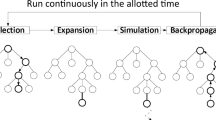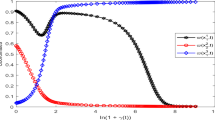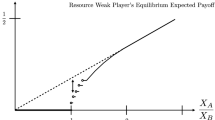Abstract
Potential games are noncooperative games for which there exist auxiliary functions, called potentials, such that the maximizers of the potential are also Nash equilibria of the corresponding game. Some properties of Nash equilibria, such as existence or stability, can be derived from the potential, whenever it exists. We survey different classes of potential games in the static and dynamic cases, with a finite number of players, as well as in population games where a continuum of players is allowed. Likewise, theoretical concepts and applications are discussed by means of illustrative examples.
Similar content being viewed by others
References
Altman E, Hayel Y, Kameda H. Evolutionary dynamics and potential games in non-cooperative routing. In: Modeling and Optimization in Mobile. Ad Hoc and Wireless Networks and Workshops. Philadelphia: IEEE, 2007, 1–5
Alvarez-Mena J, Hernández-Lerma O. Existence of Nash equilibria for constrained stochastic games. Math Methods Oper Res, 2006, 63: 261–285
Amir R. Supermodularity and complementarity in economics: An elementary survey. Southern Econ J, 2005, 71: 636–660
Arrow K J, Hurwicz L. Stability of the gradient process in n-person games. J Soc Ind App Math, 1960, 8: 280–294
Arslan G, Marden J R, Shamma J. Autonomous vehicle-target assignment: A game theoretical formulation. J Dyn Syst Meas Control, 2007, 129: 584–596
Aumann R. Subjectivity and correlation in randomized strategies. J Math Econom, 1974, 1: 67–96
Aumann R. Correlated equilibrium as an expression of Bayesian rationality. Econometrica, 1987, 55: 1–18
Basar T, Olsder G J. Dynamic Noncooperative Game Theory, 2nd ed. New York: Academic Press, 1995
Candogan O, Ozdaglar A, Parrilo P A. Dynamics in near-potential games. Games Econom Behav, 2013, 82: 66–90
Carbonell-Nicolau O, McLean R P. Refinements of Nash equilibrium in potential games. Theoret Econom, 2014, 9: 555–582
Case J. A class of games having Pareto optimal Nash equilibria. J Optim Theory Appl, 1974, 13: 379–385
Dechert W D. Optimal control problems from second order difference equations. J Econom Theory, 1978, 19: 50–63
Dechert W D. Noncooperative dynamic games: A control theoretic approach. Technical report. Department of Economics, University of Houston, 1997
Dechert W D, O’Donnell S I. The stochastic lake game: A numerical solution. J Econom Dynam Control, 2006, 30: 1569–1587
Dockner E J, Jorgensen S, Long N V, et al. Differential Games in Economics and Management Science. Cambridge: Cambridge University Press, 2000
Dragone D, Lambertini L, Leitmann G, et al. Hamiltonian potential functions for differential games. Automatica, 2015, 62: 134–138
Dragone D, Lambertini L, Palestini A. A class of best-response potential games. Working paper 635. Department of Economics, University of Bologna, 2008
Dragone D, Lambertini L, Palestini A. Static and dynamic best-response potential functions for the non-linear Cournot game. Optimization, 2012, 61: 1283–1293
Dubey P. Inefficiency of Nash equilibria. Math Oper Res, 1986, 11: 1–8
Dubey P, Haimanko O, Zapechelnyuk A. Strategic complements and substitutes, and potential games. Games Econom Behav, 2006, 54: 77–94
Erickson G. Dynamic Models of Advertising Competition, 2nd ed. Boston: Kluwer Academic Publishers, 2012
Facchini G, van Megen F, Borm P, et al. Congestion models and weighted Bayesian potential games. Theory Decis, 1997, 42: 193–206
Fonseca-Morales A, Hernández-Lerma O. Potential differential games. Http://www.math.cinvestav.mx/sites/default/files/PDG.pdf
Fox M J, Shamma J S. Population games, stable games, and passivity. Games, 2013, 4: 561–583
Fudenberg D, Levine D. The Theory of Learning in Games. Cambridge: MIT Press, 1998
Gairing M, Klimm M. Congestion games with player-specific costs revisited. In: Vöcking B, ed. Algorithmic Game Theory. Lecture Notes in Computer Science, vol. 8146. Berlin-Heidelberg: Springer, 2013, 98–109
Ghosh M K, Bagchi A. Stochastic games with average payoff criterion. Appl Math Optim, 1998, 38: 283–301
Gintis H. Game Theory Evolving: A Problem-Centered Introduction to Modeling Strategic Interaction. Princeton: Princeton University Press, 2009
Goldstein H, Poole C, Safko J. Classical Mechanics, 3rd ed. Boston: Addison-Wesley, 2002
González-Sánchez D, Hernández-Lerma O. Discrete-Time Stochastic Control and Dynamic Potential Games: The Euler-Equation Approach. New York: Springer, 2013
González-Sánchez D, Hernández-Lerma O. On the Euler equation approach to discrete-time nonstationary optimal control problems. J Dyn Games, 2014, 1: 57–78
González-Sánchez D, Hernández-Lerma O. Dynamic potential games: The discrete-time stochastic case. Dyn Games Appl, 2014, 4: 309–328
Gopalakrishnan R, Marden J R, Wierman A. Potential games are necessary to ensure pure Nash equilibria in cost sharing games. Math Oper Res, 2014, 39: 1252–1296
Harks T, Klimm M. On the existence of pure Nash equilibria in weighted congestion games. Math Oper Res, 2012, 37: 419–436
Harsanyi J C, Selten R. A General Theory of Equilibrium Selection in Games. Cambridge: MIT Press, 1988
Hart S, Schmeidler D. Existence of correlated equilibria. Math Oper Res, 1989, 14: 18–25
Haurie A, Krawczyk J B, Zaccour G. Games and Dynamic Games. Singapore: World Scientific, 2012
Hino Y. An improved algorithm for detecting potential games. Internat J Game Theory, 2011, 40: 199–205
Hofbauer J, Sandholm W H. Stable games and their dynamics. J Econom Theory, 2009, 144: 1665–1693
Hofbauer J, Sigmund K. Evolutionary game dynamics. Bull Amer Math Soc, 2003, 40: 479–519
Hofbauer J, Sorger G. Perfect foresight and equilibrium selection in symmetric potential games. J Econom Theory, 1999, 85: 1–23
Holzman R, Law-Yone N. Strong equilibrium in congestion games. Games Econom Behav, 1997, 21: 85–101
Jaskiewicz A, Nowak A S. On pure stationary almost Markov Nash equilibria in nonzero-sum ARAT stochastic games. Math Methods Oper Res, 2015, 81: 169–179
Jaskiewicz A, Nowak A S. Stochastic games of resource extraction. Automatica, 2015, 54: 310–316
Jaskiewicz A, Nowak A S. Stationary almost Markov perfect equilibria in discounted stochastic games. Math Oper Res, 2016, 41: 430–441
Jensen M K. Aggregative games and best-reply potentials. Econom Theory, 2010, 43: 45–66
Jørgensen S, Zaccour G. Differential Games in Marketing. New York: Springer, 2004
Kukushkin N S. A fixed-point theorem for decreasing mappings. Econom Lett, 1994, 46: 23–26
Kukushkin N S. Potential games: A purely ordinal approach. Econom Lett, 1999, 64: 279–283
Kukushkin N S. Best response dynamics in finite games with additive aggregation. Games Econom Behav, 2004, 48: 94–110
La Q D, Chew Y H, Soong B H. Potential Game Theory: Applications in Radio Resource Allocation. New York: Springer, 2016
Mallozzi L. An application of optimization theory to the study of equilibria for games: A survey. Cent Eur J Oper Res, 2013, 21: 523–539
Marden J, Arslan G, Shamma J. Cooperative control and potential games. IEEE Trans Syst Man Cyber, 2009, 39: 1393–1407
Mendoza-Palacios S, Hernández-Lerma O. Evolutionary dynamics on measurable strategy spaces: Asymmetric games. J Differential Equations, 2015, 259: 5709–5733
Michel A N, Hou L, Liu D. Stability of Dynamical Systems: On the Role of Monotonic and Non-Monotonic Lyapunov Functions. Basel: Birkhäuser, 2015
Milchtaich I. Congestion games with player-specific payoff functions. Games Econom Behav, 1996, 13: 111–124
Milchtaich I. Weighted congestion games with separable preferences. Games Econom Behav, 2009, 67: 750–757
Monderer D, Shapley L S. Potential games. Games Econom Behav, 1996, 14: 124–143
Monderer D, Shapley L S. Fictitious play property for games with identical interests. J Econom Theory, 1996, 1: 258–265
Nash J F. Equilibrium points in n-person games. Proc Nat Acad Sci USA, 1950, 36: 48–49
Neyman A. Correlated equilibrium and potential games. Internat J Game Theory, 1997, 26: 223–227
Osborne M J, Rubinstein A. A Course in Game Theory. Boston: MIT Press, 1994
Park J. Potential games with incomplete preferences. J Math Econom, 2015, 61: 58–66
Peleg B. Almost all equilibria in dominant strategies are coalition-proof. Econom Lett, 1998, 60: 157–162
Philpott A. Mathematics of Electricity Markets under Uncertainty. Philadelphia: SIAM, 2014
Pontryagin L S, Boltyanskii V G, Gamkrelidze R V, et al. The Mathematical Theory of Optimal Processes. New York: Interscience Publishers, 1962
Potters J A M, Raghavan T E S, Tijs S H. Pure equilibrium strategies for stochastic games via potential functions. In: Advances in Dynamic Games and Their Applications. Boston: Birkhauser, 2009, 433–444
Reddy V, Shakkottai S, Sprintson A, et al. Multipath wireless network coding: A population game perspective. Proc IEEE Infocom, 2010, 54: 1–9
Rosenthal R W. A class of games possessing pure-strategy Nash equilibria. Internat J Game Theory, 1973, 2: 65–67
Sandholm W H. Potential games with continuous player sets. J Econom Theory, 2001, 97: 81–108
Sandholm W H. Large population potential games. J Econom Theory, 2009, 144: 1710–1725
Sandholm W H. Population Games and Evolutionary Dynamics. Boston: MIT Press, 2010
Sandholm W H. Population games and deterministic evolutionary dynamics. In: Handbook of Game Theory with Economic Applications, vol. 4. Amsterdam: Elsevier, 2015, 703–778
Shakkottai S, Altman E, Kumar A. Multihoming of users to access points in WLANs: A population game perspective. IEEE J Sel Areas Commun, 2007, 25: 1207–1215
Shamma J S. Learning in Games. London: Springer, 2015
Shapley L S. Stochastic games. Proc Nat Acad Sci USA, 1953, 39: 1095–1100
Slade M E. The fictitious-payoff function: Two applications to dynamic games. Ann économ Statist, 1989, 15/16: 193–216
Slade M E. What does an oligopoly maximize? J Ind Econom, 1994, 42: 45–61
Trélat E, Zuazua E. The turnpike property in finite-dimensional nonlinear optimal control. J Differential Equations, 2015, 258: 81–114
Ui T. Correlated equilibrium and concave games. Internat J Game Theory, 2008, 37: 1–13
Uno H. Nested potential games. Econom Bull, 2007, 3: 1–8
Uno H. Strategic complementarities and nested potential games. J Math Econom, 2011, 47: 728–732
van Heumen R, Peleg B, Tijs S, et al. Axiomatic characterizations of solutions for Bayesian games. Theory and Decision, 1996, 40: 103–129
Voorneveld M. Best-response potential games. Econom Lett, 2000, 66: 289–295
Voorneveld M, Borm P, Van Megen F, et al. Congestion games and potentials reconsidered. Int Game Theory Rev, 1999, 1: 283–299
Voorneveld M, Norde H. A characterization of ordinal potential games. Games Econom Behav, 1997, 19: 235–242
Yang Y, Rubio F, Scutari G, et al. Multi-portfolio optimization: A potential game approach. IEEE Trans Signal Process, 2013, 61: 5590–5601
Yeung D W, Petrosyan L A. Cooperative Stochastic Differential Games. New York: Springer, 2006
Young H. Strategic Learning and Its Limits. Oxford: Oxford University Press, 2004
Zazo S, Valcarcel Macua S, Sánchez-Fernández M, et al. A New Framework for Solving Dynamic Scheduling Games. New York: IEEE, 2015
Zazo S, Zazo J, Sánchez-Fernández M. A control theoretic approach to solve a constrained uplink power dynamic game. In: Proceedings of the 22nd European Signal Processing Conference. Lisbon: EURASIP, 2014: 401–405
Author information
Authors and Affiliations
Corresponding author
Rights and permissions
About this article
Cite this article
González-Sánchez, D., Hernández-Lerma, O. A survey of static and dynamic potential games. Sci. China Math. 59, 2075–2102 (2016). https://doi.org/10.1007/s11425-016-0264-6
Received:
Accepted:
Published:
Issue Date:
DOI: https://doi.org/10.1007/s11425-016-0264-6
Keywords
- noncooperative games
- potential games
- Nash equilibrium
- dynamic games
- Markov games
- differential games
- population games




